|
|
|
Sort Order |
|
|
|
Items / Page
|
|
|
|
|
|
|
| Srl | Item |
| 1 |
ID:
130006
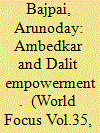

|
|
|
|
|
| Publication |
2014.
|
| Summary/Abstract |
Dr B R Ambedkar was convinced that unless the marginalized sections of Indian society secured the political power, it was not possible to completely wipe out all social, legal and cultural disabilities, from which they suffered (Desai: 1959). Thus, for the political organization and political mainstreaming of Dalits, he pleaded for their representation in legislatures in the Round Table Conferences, 1930-32, convened by the British government. Both Ambedkar and British government supported Dalit representation in the legislatures on the basis of separate electorate, which meant that in the reserved constituencies only Dalits would be allowed to vote. This was the crux of Communal Award announced by the British government in 1932.
|
|
|
|
|
|
|
|
|
|
|
|
|
|
|
|
| 2 |
ID:
130443
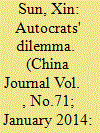

|
|
|
|
|
| Publication |
2014.
|
| Summary/Abstract |
How do authoritarian elections affect voters' attitudes toward the regime and their support for democracy? This article draws upon the case of village elections in China to argue that elections may have two simultaneous effects. First, free and fair elections increase citizens' confidence in the government. Second, elections also allow voters to exercise political rights and accumulate democratic experience through participation, and this in turn may trigger greater demand for further empowerment. Empirical analysis of data from a two-round nationwide survey conducted in 114 villages confirms both effects. One implication of these findings is that competitive elections may simultaneously boost regime popularity and increase public demand for further democratic reform.
|
|
|
|
|
|
|
|
|
|
|
|
|
|
|
|
| 3 |
ID:
172565
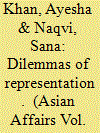

|
|
|
|
|
| Summary/Abstract |
Recognizing constraints Pakistani women legislators face despite their entry into politics on a 17 per cent quota in national and provincial assemblies, it is time to rethink how quotas can lead to their political mainstreaming. This article explores quota legislators' views on their own accountability and empowerment based on the first online survey in Pakistan with 200 women in the assemblies (2013-18). Findings show quota legislators resist classification as male proxies and view themselves as accountable to notional voters, although they are indirectly elected. Many report silencing and harassment by male colleagues. Cross-party women's caucuses in each assembly have a mixed track record of facilitating substantive representation, undermined by religious parties and class differences. Respondents favoured further affirmative action mechanisms to increase their political voice, e.g. additional quota requirements within parties, more tickets for general seats and participation in key decision-making bodies of parties. A trajectory for women in politics to move from quota seats (in local bodies and assemblies) to general seats is not yet in place.
|
|
|
|
|
|
|
|
|
|
|
|
|
|
|
|
| 4 |
ID:
116149
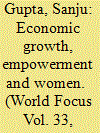

|
|
|
| 5 |
ID:
127807
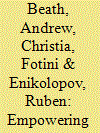

|
|
|
|
|
| Publication |
2013.
|
| Summary/Abstract |
In societies with widespread gender discrimination, development programs with gender quotas are considered a way to improve women's economic, political, and social status. Using a randomized field experiment across 500 Afghan villages, we examine the effects of a development program that mandates female participation. We find that even in a highly conservative context like Afghanistan, such initiatives improve outcomes specific to female participation in some economic, social, and political activities, including increased mobility and income generation. They, however, produce no change in more entrenched female roles linked to family decision-making or in attitudes toward the general role of women in society.
|
|
|
|
|
|
|
|
|
|
|
|
|
|
|
|
| 6 |
ID:
129485
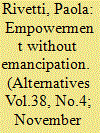

|
|
|
|
|
| Publication |
2013.
|
| Summary/Abstract |
This article examines the centrality of political activism in the identity of Iranian refugees and investigates how they perform and incorporate it by considering the interlocked pressure of international politics, personal networks, and the assistance provided by civil society organizations. The case of Iranian political refugees in Italy and Turkey is of particular interest because of the international visibility of the Green movement, the Iranian people's historical experience of emigration, and the fact that Iran is a subject of great interest for a number of human rights nongovernmental organizations (NGOs). It shows how the process of "being a refugee" works not only through classical forms of institutional pressure but also through "unexpected" forms such as NGO efforts to empower refugees politically. Despite the positive value attached to it, in this context political activism can force refugees into preestablished roles, such as "human rights defenders" or "Green movement activists." Paradoxically, refugees act within a context that dominates them even when it tries to empower them.
|
|
|
|
|
|
|
|
|
|
|
|
|
|
|
|
| 7 |
ID:
081821
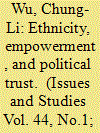

|
|
|
| 8 |
ID:
115257
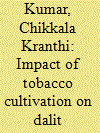

|
|
|
|
|
| Publication |
2012.
|
| Summary/Abstract |
This paper highlights the consequences of the economic and educational change among the Dalits of Karavadi. The tobacco cultivation that engages a large amount of labour has attracted the left political parties for the spread of their ideology and recruitment of party workers. It has helped in working against the practice of untouchability. Further, it has enabled the Dalits to be politically conscious and seriously participate in the political process. The growth of educational institutions in the village and the economic improvement have together helped the Dalits to assert their political and economic rights in the village. As a cumulative effect, the hegemonic inter-caste relations in the village have changed, though caste bias has not disappeared.
|
|
|
|
|
|
|
|
|
|
|
|
|
|
|
|
| 9 |
ID:
125282
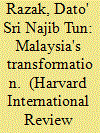

|
|
|
|
|
| Publication |
2013.
|
| Summary/Abstract |
Malaysia has one overarching and transformative policy objective: to achieve high income and developed nation status by the year 2020. High income nations, as defined by the World Bank, are those with a gross national income per capita of US$12,480 or more in 2011. Malaysia's per capita income now stands close to US$10,000 and the aim is to increase it to US$15,000 by 2020. My view is that developed nations should also meet a number of other important benchmarks. For instance, a nation's wealth must be reasonably distributed, not concentrated in the hands of the elite; physical and social infrastructure must be robust; and, most importantly, a developed country should be democratic and respect basic freedoms.
|
|
|
|
|
|
|
|
|
|
|
|
|
|
|
|
| 10 |
ID:
110110
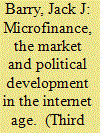

|
|
|
|
|
| Publication |
2012.
|
| Summary/Abstract |
This article steps outside traditional economic analysis of microfinance, and instead investigates the political ramifications of microfinance in developing countries. In particular, I argue that microfinance affects social capital, political empowerment and democratisation. I examine three emerging trends in microfinance: new technology; the rise of for-profit microfinance institutions; and the increase in individual, rather than group microfinance lending. In exploring these trends, I analyse seven prominent institutions: non-profits Kiva, Global Giving, Calvert Organization and MicroCredit Enterprises; and for-profits MicroPlace, MicroVest, and Oikocredit. My findings indicate that different types of microfinance institutions have unique characteristics that influence political development in a variety of ways, including but not limited to: democratisation, social capital, and economic and political empowerment. The article attempts to fill a gap in the literature and open up a conversation as to how differing approaches to microfinance lending influence political development.
|
|
|
|
|
|
|
|
|
|
|
|
|
|
|
|
| 11 |
ID:
101998
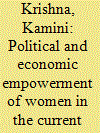

|
|
|
| 12 |
ID:
089638
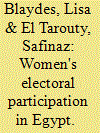

|
|
|
|
|
| Publication |
2009.
|
| Summary/Abstract |
To what extent do gender considerations impact voter recruitment strategies in Middle Eastern elections? Based on an examination of voting behavior in Egypt, we find that clientelist voter recruitment tends to empower women economically rather than politically as elections provide an opportunity for disadvantaged women to sell their vote to local vote brokers or offer their vote to a local patron in exchange for a future payoff. In contrast, women who vote for Islamist candidates may be able to increase the influence of their political support by creating common knowledge about the popularity of their candidate and by reducing the effectiveness of government repression.
|
|
|
|
|
|
|
|
|
|
|
|
|
|
|
|
|
|
|
|
|